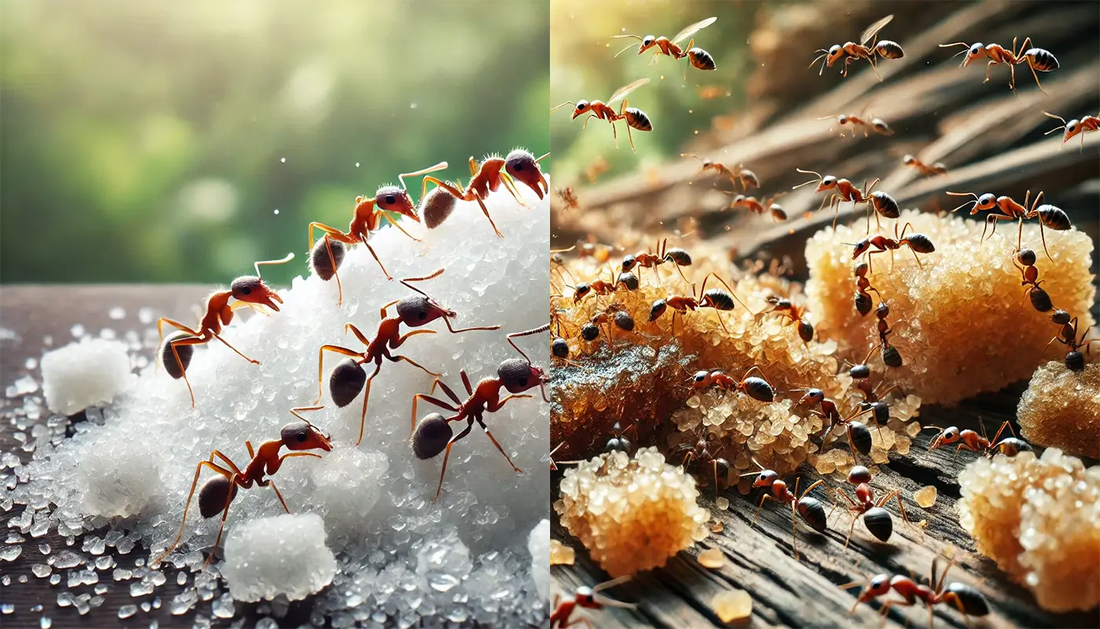
Ants and refined white sugar: What makes them wary?
Ants are fascinating creatures. Known for their discipline and teamwork, they can find food from miles away. However, one surprising observation leaves many puzzled: ants often avoid refined white sugar. Why does this happen? Let’s explore the reasons behind this unusual behaviour.
Ants’ strong sense of smell and hence ants avoid refined white sugar
Ants rely heavily on their sense of smell to locate food. Their antennae are highly sensitive and can detect even minute particles of sugar. While refined white sugar is sweet, it lacks the complexity and natural aroma found in other food sources like fruits or raw sugars.
When ants come across refined white sugar, their sensory systems may not respond as strongly. This could explain why they sometimes seem uninterested in it. In contrast, the natural sweetness of honey or jaggery often attracts them instantly.
The processing of refined sugar
Refined white sugar undergoes extensive processing. During this process, natural minerals and nutrients are stripped away. What remains is pure sucrose, devoid of any significant nutritional value.
Ants, like most creatures, are instinctively drawn to foods rich in nutrients. Raw or traditional sugars and natural sweeteners contain trace minerals that appeal to them. Refined white sugar, on the other hand, offers no such benefits. This lack of nutrition could be a key factor in why ants are wary of it.
Chemical additives and residues
Another reason could be chemical residues left during sugar refinement. Manufacturers use chemicals like sulphur dioxide and phosphoric acid to bleach and purify sugar. Although these chemicals are considered safe for human consumption, their residues may repel ants.
Ants are extremely sensitive to environmental changes and chemicals. The presence of even tiny amounts of unfamiliar substances might discourage them from consuming refined sugar. Their survival instincts help them avoid potential toxins.
Texture and granule size matter
The texture of refined white sugar could also play a role. Its fine granules may not be as appealing to ants as the coarser textures of raw sugar or honey. Coarser granules are easier for ants to carry back to their colonies.
Moreover, refined sugar dissolves quickly in moisture, making it less accessible in certain conditions. This could further reduce its appeal to ants, who prefer solid, easy-to-transport food sources.
Natural sugars mimic ants’ dietary preferences
In nature, ants typically consume foods like nectar, honeydew from aphids, and other plant-based sugars. These natural sources are unprocessed and packed with nutrients. They align closely with ants’ dietary needs.
Refined sugar, on the other hand, is far removed from anything ants would encounter in their natural habitat. This mismatch may explain their hesitancy to accept it as food.
Health implications for ants
Just like humans, ants can face health issues from consuming certain substances. While refined sugar may not directly harm them, it does not provide any beneficial nutrients. Colonies thrive on balanced diets. Foods that offer little value are often ignored to ensure the colony’s health.
This instinctive choice helps ants sustain themselves and their growing communities. It’s nature’s way of ensuring their survival.
Environmental factors could influence behaviour
Sometimes, the environment plays a role in how ants interact with food. In humid conditions, refined sugar absorbs moisture quickly, becoming sticky. This change in texture might deter ants from consuming it.
Additionally, the presence of other, more enticing food sources nearby could shift their focus away from refined sugar. Ants are opportunistic feeders and will always prioritize the most rewarding options.
Can refined sugar attract ants at all?
Despite their general wariness, ants are not completely immune to refined sugar’s allure. If no other food is available, they might consume it out of necessity. However, this behaviour is rare. Ants typically prefer alternatives that align with their natural preferences.
What does this mean for humans?
Understanding why ants avoid refined sugar can offer insights into our own diets. Refined white sugar is often criticized for its lack of nutrients and potential health risks. The fact that even ants hesitate to consume it might make us reconsider its place in our meals.
Opting for more natural sweeteners, like honey or jaggery, could benefit both our health and the environment. These alternatives provide essential nutrients and are less processed, making them better options overall.
Conclusion: Ants avoid refined white sugar
Ants are nature’s perfect scavengers. Their behaviour towards refined white sugar reflects their instinctive need to prioritize nutrient-rich foods. Factors like processing, chemical residues, and lack of aroma all contribute to their wariness.
Next time you notice ants ignoring refined sugar, remember the reasons behind their choice. Their natural instincts are a reminder for us to pay attention to what we consume. Perhaps, like ants, we too should lean towards healthier and more natural options.
By understanding the behaviour of these tiny creatures, we gain valuable lessons about nutrition and nature. And who knew ants could teach us so much about our sugar intake?
Image Courtesy: ACCENTERRA
Did you find this blog post helpful? Got ideas or questions? Join the conversation below! Your insights could help others too, so don’t hesitate to share!
Please note that all comments will be moderated before being published.
